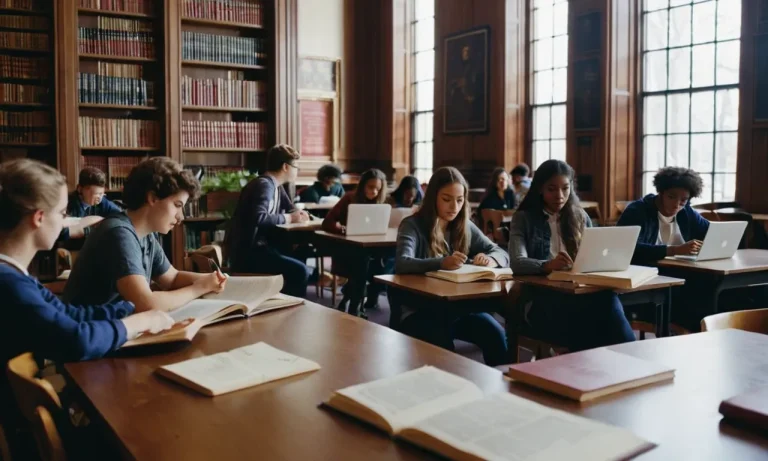Attending school regularly is crucial for academic success, but sometimes circumstances arise that make it necessary to miss classes. Whether it’s due to illness, family emergencies, or other valid reasons, being absent from school is sometimes unavoidable.
If you’re short on time, here’s a quick answer to your question: Legitimate reasons for being absent from school include illness, family emergencies, religious observances, medical appointments, and school-approved activities or events.
In this comprehensive article, we’ll explore the various legitimate reasons for being absent from school, the importance of providing proper documentation, and strategies for catching up on missed work.
We’ll also discuss the potential consequences of excessive absences and how to maintain good attendance.
Illness and Medical Reasons
Being absent from school due to illness or medical reasons is perfectly legitimate and understandable. After all, our health should always come first! Here are some valid reasons for missing school that fall under this category:
Physical Illness
Contagious illnesses like the flu, strep throat, or stomach bugs can spread quickly in a school setting, making it necessary to stay home and recover. According to the Centers for Disease Control and Prevention (CDC), children with flu-like symptoms should remain at home until they have been fever-free for at least 24 hours without the use of fever-reducing medication.
Don’t risk infecting others – stay home and get well!
Mental Health Concerns
Mental health is just as important as physical health, and sometimes taking a mental health day can be crucial. Conditions like anxiety, depression, or stress can make it challenging to focus and participate in school activities. If you’re feeling overwhelmed, don’t hesitate to take a break.
In fact, a study found that students who took occasional mental health days had better overall mental health and academic performance.
Chronic Conditions
For students with chronic conditions like asthma, diabetes, or autoimmune disorders, flare-ups or complications may require time off from school. It’s essential to prioritize managing these conditions and seeking appropriate medical care when needed.
Many schools have policies in place to accommodate students with chronic illnesses, so don’t hesitate to communicate with your teachers and school administrators.
Medical Appointments
Regular check-ups, specialist visits, or medical procedures often require missing school. These appointments are crucial for maintaining good health and addressing any medical concerns promptly. It’s always better to prioritize your well-being and attend these appointments, even if it means missing a few classes.
Most schools understand the importance of medical appointments and will work with you to catch up on missed work.
Remember, your health should always come first! Don’t feel guilty or ashamed about missing school due to legitimate medical reasons. Communicate openly with your teachers and school administrators, and take the time you need to recover or address your health concerns.
After all, a healthy mind and body will ultimately lead to better academic performance and overall well-being. 👍
Family Emergencies and Obligations
Every student encounters situations where they must prioritize family over academics. These legitimate reasons for being absent from school are often unavoidable and should be handled with empathy and understanding.
Here are some common family emergencies and obligations that may require a student’s absence:
Death in the Family
The loss of a loved one is a profound and emotionally devastating experience. When a student experiences the death of an immediate family member, such as a parent, sibling, or grandparent, they may need time away from school to grieve, attend funeral services, and support their family during this difficult period.
According to the National Center for Education Statistics, approximately 7% of students in the United States miss school due to a family member’s death each year.
Caring for a Sick Family Member
Illness can strike anyone, and when a family member becomes seriously ill, a student may need to take on caregiving responsibilities or provide emotional support. This could involve taking a loved one to medical appointments, administering medication, or simply being present during their recovery.
A study by the National Alliance for Caregiving found that approximately 24% of caregivers are between the ages of 18 and 34, which includes many college-aged students.
Legal or Court Obligations
In some cases, students may need to miss school due to legal or court obligations, such as serving as a witness in a trial or attending a court-mandated appointment. These situations are typically beyond the student’s control and can have serious consequences if not addressed. The U.S.
Department of Justice provides guidelines for witness attendance, emphasizing the importance of complying with legal summons.
Family Relocation
Occasionally, families may need to relocate due to various reasons, such as a job transfer, military deployment, or personal circumstances. During this transition period, students may need to take time off from school to pack, travel, and settle into their new living situation.
According to a report by the U.S. Census Bureau, approximately 8.4% of Americans moved in 2021, with many of those moves involving families with school-aged children.
In all of these situations, it’s essential for schools to have clear policies and procedures in place to accommodate students who need to be absent for legitimate family emergencies and obligations. By understanding and supporting students during these challenging times, schools can promote a compassionate and inclusive learning environment while ensuring that students don’t fall behind academically.
Religious and Cultural Observances
Schools recognize the significance of religious and cultural practices, allowing students to observe and celebrate their beliefs without compromising their education. Here’s what you need to know about legitimate absences related to religious and cultural observances:
Religious Holidays
Students are generally permitted to be absent from school for major religious holidays observed by their faith. Some examples include:
- Christmas and Easter for Christians
- Eid al-Fitr and Eid al-Adha for Muslims
- Rosh Hashanah and Yom Kippur for Jews
- Diwali for Hindus, Sikhs, and Jains
According to a 2020 report by the National Center for Education Statistics, around 15% of public school students in the U.S. are from diverse religious backgrounds, highlighting the need for accommodations.
Cultural Celebrations
Many schools also allow excused absences for significant cultural celebrations and events. These may include:
- Indigenous Peoples’ Day or Native American Heritage Month
- Lunar New Year for Asian communities
- Día de los Muertos (Day of the Dead) for Hispanic/Latino communities
Celebrating diversity and fostering an inclusive environment are crucial for students’ overall well-being and academic success. A 2019 study by Education Week found that students who feel their cultures are valued and represented in their schools perform better academically. 😊
Accommodations for Religious Practices
Beyond holidays, schools may also provide accommodations for religious practices that require absence or special arrangements. For example:
- Friday prayer for Muslim students
- Fasting during Ramadan or Yom Kippur
- Wearing religious attire or symbols
The U.S. Department of Education emphasizes the importance of respecting students’ religious beliefs and providing reasonable accommodations. By fostering an inclusive environment, schools can promote understanding, tolerance, and respect for diversity, which are essential values in our increasingly multicultural society.
👏
School-Approved Activities and Events
Being absent from school is sometimes unavoidable, but there are legitimate reasons that are approved by educational institutions. One such category is school-approved activities and events. These activities not only enhance students’ learning experience but also foster their personal growth and development.
Field Trips and Educational Excursions
Field trips and educational excursions are an integral part of the learning process. They provide students with hands-on experiences and opportunities to explore concepts beyond the classroom walls. According to a study by the Edutopia, students who participate in field trips demonstrate increased engagement, motivation, and academic performance.
These excursions allow students to connect theoretical knowledge with real-world applications, making the learning experience more meaningful and memorable.
Athletic Events and Competitions
Participation in athletic events and competitions is another legitimate reason for being absent from school. Physical education and sports play a crucial role in promoting a healthy lifestyle, teamwork, and discipline among students.
According to data from the Centers for Disease Control and Prevention (CDC), regular physical activity can improve academic performance, cognitive skills, and classroom behavior. Schools recognize the importance of these events and often grant excused absences for students to participate in athletic competitions, both within and outside the school district.
School-Sponsored Conferences or Workshops
Attending school-sponsored conferences or workshops is yet another valid reason for being absent from school. These events provide students with valuable opportunities to network, learn from experts in their fields of interest, and develop essential skills such as public speaking, leadership, and critical thinking.
For example, the SkillsUSA organization hosts annual conferences and competitions that attract thousands of students from across the United States, allowing them to showcase their talents and gain industry-relevant experience.
It’s important to note that while these school-approved activities and events are considered legitimate reasons for being absent, students and their families should still follow the proper procedures for obtaining approval and providing documentation.
By participating in these enriching experiences, students not only broaden their horizons but also develop essential skills that will benefit them throughout their academic journey and beyond. So, embrace these opportunities and make the most of the educational experiences your school has to offer! 😊
Conclusion
Being absent from school is sometimes unavoidable, but it’s essential to ensure that absences are legitimate and properly documented. By understanding the various valid reasons for missing school, students and parents can make informed decisions and take appropriate steps to minimize the impact on academic progress.
Remember, excessive absences, even if excused, can have detrimental effects on a student’s education. It’s crucial to maintain good attendance whenever possible and work closely with teachers and school administrators to catch up on missed work and assignments.
By following the guidelines outlined in this article and communicating openly with school authorities, students can navigate legitimate absences while prioritizing their academic success and personal well-being.






